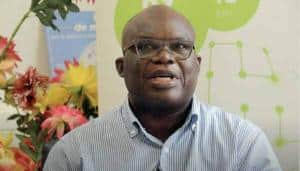
To activate translation, click the “CC” button along the bottom of the video player. Then click the Settings button next to it, select Subtitles/CC, and click on Auto-translate and select the language you want to read captions.
Pour activer la traduction, cliquez sur le bouton “CC” en bas du lecteur vidéo. Cliquez ensuite sur le bouton Paramètres à côté, sélectionnez Sous-titres / CC, puis cliquez sur Traduction automatique et sélectionnez la langue que vous souhaitez lire les sous-titres.
In order to explore a diversity points of view on the commons, we conducted a series of interviews with people who work on the commons and are part of government agencies for development, research organisations, and, NGOs. We conducted a qualitative analysis of the transcript of the interviews. We will present the lessons drawn from this analysis. We highlight some of them here: For most of the surveyed people, the domain of the commons was introduced by an experience or a meeting that changed their outlook on their own actions. The commons translate a vision of society: supporting or promoting them contributes to a project of society. Most of the authors deplore the domination of the State and the market, but they indicate the commons should be articulated with these dominant forces The multiplicity of perceptions on the commons challenge the ‘interest of a typology. However there is a need to name them to recognize them, and the debate is then on how it should be recognized. On this subject, many contributions relate to laws, but this is not the unique channel to formalize.
Afin d’explorer une diversité de points de vue sur les biens communs, nous avons mené une série d’entretiens avec des personnes qui travaillent sur les biens communs et font partie d’organismes gouvernementaux de développement, d’organisations de recherche et d’ONG. Nous avons effectué une analyse qualitative de la transcription des entretiens. Nous présenterons les enseignements tirés de cette analyse. Nous en soulignons certains ici: Pour la plupart des personnes interrogées, le domaine des communs a été introduit par une expérience ou une réunion qui a changé leur regard sur leurs propres actions. Les communs traduisent une vision de la société: les soutenir ou les promouvoir contribue à un projet de société. La plupart des auteurs déplorent la domination de l’État et du marché, mais ils indiquent que les biens communs devraient être articulés avec ces forces dominantes. La multiplicité des perceptions sur les biens communs remet en cause l’intérêt d’une typologie. Cependant, il est nécessaire de les nommer pour les reconnaître, et le débat porte alors sur la manière de les reconnaître. A ce sujet, de nombreuses contributions concernent les lois, mais ce n’est pas le seul moyen de formaliser.
2 Responses
Interesting overview. From what I understood there seem not a lot of disagreements among those interviewed. What are the main challenges seen for the future of the commons?
Thank you Marco for your interest.
Two answers, one on disagreements, one on challenges.
On disagreements.
28 interviews were conducted, and 20 interviewees agreed to have their interview published. Among those 20 it is true that there are no strong disagreements but several nuances, such as the ontological vs strategic use of the concept of the commons (are commons a new project of society or a means for given objectives), or the formalisation of rules in the law or not. Within the 8 interviewees who did not want to have their interview published, several have doubts about the commons concept, as a new fashion and also as a concept which can be in competition with the concept of territoire (place-based research), as a concept which is difficult to manage with a project-based governance and which challenges state/market power.
On challenges
There is the challenge of identity and sovereignity “The stakes are even bigger than that, especially in the context of land, because a community’s ownership of land has a lot to do with its culture and identity. That’s an enormously important thing to preserve. People often want to create or preserve a common because they want to maintain their way of life and cultural identity that may go back centuries” (Bollier). However identity and sovereignity are also central arguments for exclusion.
The second concept is the idea of plurality of perspectives, which includes plurality of perspectives on the commons.
The third challenge is to find an articulation between the commons and the market and the state. Specifically in several parts of the world the state is weakened and more and more fragile, which causes very severe problems (security, justice, health, education…). How to protect and favour the Commons without contributing to the weakening of the state?
Comments are closed.